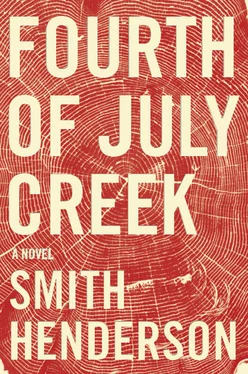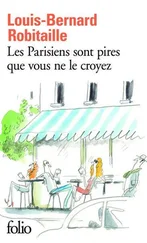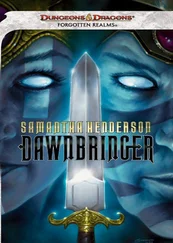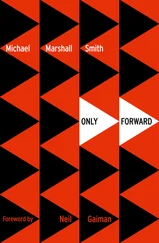“Is that the only way out?” Pete asked, pointing to the hole.
The boy crawled around him and propped open the canvas at the rear on a stick. Pete crawled out with him onto a ledge the size of a small patio. A vista of the wilderness, alder and cedar. Greater cloud-kissed mountains rearing up many miles away. A bed of white coals lay under a blackened overhang where they cooked. Pete peered over the ledge down a forty-foot face that aproned into a scree.
“Nice view,” Pete said.
The boy slipped down the side of the cliff face to a foot-wide ledge.
“Okay, okay. Get back up here.”
“I’m not gonna fall, Pete.”
“Just come back.”
The boy pulled himself up with a self-satisfied dexterity and sat with his legs over the edge.
“You afraid of heights?” Ben asked.
“Just falling from them.”
Ben digested the joke and then chortled like a donkey.
He watched Pete squat and take off his pack. He took in every detail of Pete, and Pete understood now why he’d been lured into the school. The boy was terrifically bored.
Pearl pitched out some firewood from within the shelter and the boy went and started the fire. The man came out with three open cans and set them inside the fire pit next to the flames and crouched back inside. The ledge was small enough that someone was always at the lip, usually the boy. Pete was terrified the child would fall, and never got used to him walking along the edge.
They ate beans quietly. Ben watching to see if his father or Pete would talk, knowing that he himself should not. The back wall of the shelter was a rock face where the water ran like a leaky tap, which of a sort it was. You put a cup against the green slick and in a few moments it was full of potable water. At the other end of the shelter was a hole like an old-time jakes where they defecated down into the creek. Pearl took their cans and pitched them down the hole. The boy went out to piss off the ledge, leaning and twisting like he had a trout at the end of his line of urine. When Pete went to piss, the boy asked how far out could he could do it, he wanted to see.
“I can’t go with you standing there,” Pete said.
The boy laughed at this preposterousness.
“I mean it,” Pete said.
His father called him inside and Pete could see the man’s amusement by the lamplight.
“You can’t pee with me standing there?” Ben said when he got back inside. “That’s so hilarious.”
“Hand me my backpack.”
The boy pulled it out from the corner and slid it over to him. Pete opened it and plucked out a handful of loose crayons and the coloring book. He set them in front of Ben. But the boy didn’t touch any of it.
“It’s a coloring book,” Pete said. “You’ve seen a coloring book, right?”
The boy nodded.
“Go ahead. It’s yours.”
“I can’t.”
“Why not?”
“It’s graven images.”
“Graven images?”
Pearl didn’t look up from the knife he sharpened on a small whetstone.
“It’s just trains and things. Look,” Pete said, opening the book and beginning to color a race car. The kid sat there.
“It’s not allowed,” Ben said.
“Deuteronomy Four,” Pearl added.
“Sorry, but you’ll have to refresh me.”
“It’s forbidden to make a likeness.”
“A likeness.”
“A likeness is a distraction from God.”
“A coloring book. Is a distraction from God.”
“Everything. Television, trees, and animals themselves. Everything.”
“This explains a great deal, Jeremiah.”
“The world is a just grain of sand in all of everything that truly is. To linger on this world is foolish. To linger is to stare at your navel.”
Pete sat a moment stock-still in the wake of this, the silliest thing he’d ever heard.
“Tell me something,” he said, shoving the coloring book and crayons back in his bag. “Did Adam have a navel?”
Pearl smiled.
“Of course not.”
They spotted a black bear sniffing up at them from the base of the cliff. Benjamin threw rocks down at it, and the animal bolted up the hillside opposite and disappeared in the trees. They ate fish and what food Pete had brought them. Pearl mended the boy’s shirt, and when Pete said he could bring them some new clothes, Pearl supposed that would be all right. A sign the man had begun to trust him. And the boy’s trust in him had blossomed into a fuller effort to impress Pete, about to the point of nuisance. He sought Pete’s opinion on how he ought to climb that tree or how far he could throw that rock. He took Pete by the arm to inspect things, rotted tree stumps and bear shit. Black centipedes twisting all their tar-black thoraxes sent him about into ecstasy. The child was an insatiable collector of stones and bits of driftwood, pockets to bursting. A steady discourse poured out of him concerning the flora and fauna, anthills and snowberries and bobcat prints. Pearl seemed inured to it, quiet. Or maybe he was simply grateful for the fresh set of ears the boy now had handy.
A thunderstorm trekked in on gray curdled clouds, and the rock wall at the back of the shelter wept with rainwater. Pearl warmed his hands by cupping the lamp and he darkled the shelter, made capes of shadow on the walls.
All evening he worked his little mint on a round in the corner. Over and over, he’d set a penny on a railroad fishplate and with a punch and hammer knock a hole through Lincoln’s temple, then chuck the coin into a coffee can. He did this to a few more presidents and then put a thin blade through the hole of one of them and affixed the blade and coin to a small jeweler’s saw. He carefully adjusted the screws so as not to break the blade. Pete could see he only had a few of them left in the cardboard drawer. He waxed the blade with a small bar of yellow wax and then set the coin over the crotch of a wooden V-shaped bench pin and began to saw, turning the coin or the bench pin to suit the angles of his imagination. When it was done, he unscrewed one end of the blade from the saw and slipped the coin into his palm and held it up to the lantern, casting a watery pentagram on the back wall. All of it accomplished much easier by Pearl than the pawnbroker had thought possible.
Pete asked to see. The coin was warm, a perfect five-point star in the copper of Lincoln’s head.
Pearl held up a paper sack of coins.
“I will have these punched and scored by tomorrow.”
He tossed another sack made of felt and full of coins to Pete and told him to put the penny in with them. Pete dropped it in and fingered through the others. More stars and exclamation points and question marks and swastikas. Clovers. What looked like a scythe.
“I’d like you to disperse them,” Pearl said as he threaded another coin onto the blade and then screwed it shut. “You can travel more widely than we can.”
“I thought you were finished with the coins,” Pete said. “Just a whimper, you said.”
“This is it.” Pearl rubbed his finger on the fishplate and his finger turned gray with the dust of the coins he’d vandalized. “The last money I’ll ever touch.”
He began to saw the next coin, a soft almost pleasing sound that for Pete immediately recalled Rachel pulling the zipper on her jacket up and down. Sitting in his car. Waiting for the light to change.
“Why do you want me to distribute these?”
“It’ll be over soon.”
“What will?”
Benjamin picked dirty sap from his hands.
“They will come and kill us.”
“No one’s coming to kill you—”
“Someone shot the president, Pete.”
“So?”
“The Secret Service is an arm of the Treasury. They have two missions: keep the president alive and protect the integrity of the US dollar. And the latter, I assure you, is more important than the former. They know all about me, Pete.”
Читать дальше












